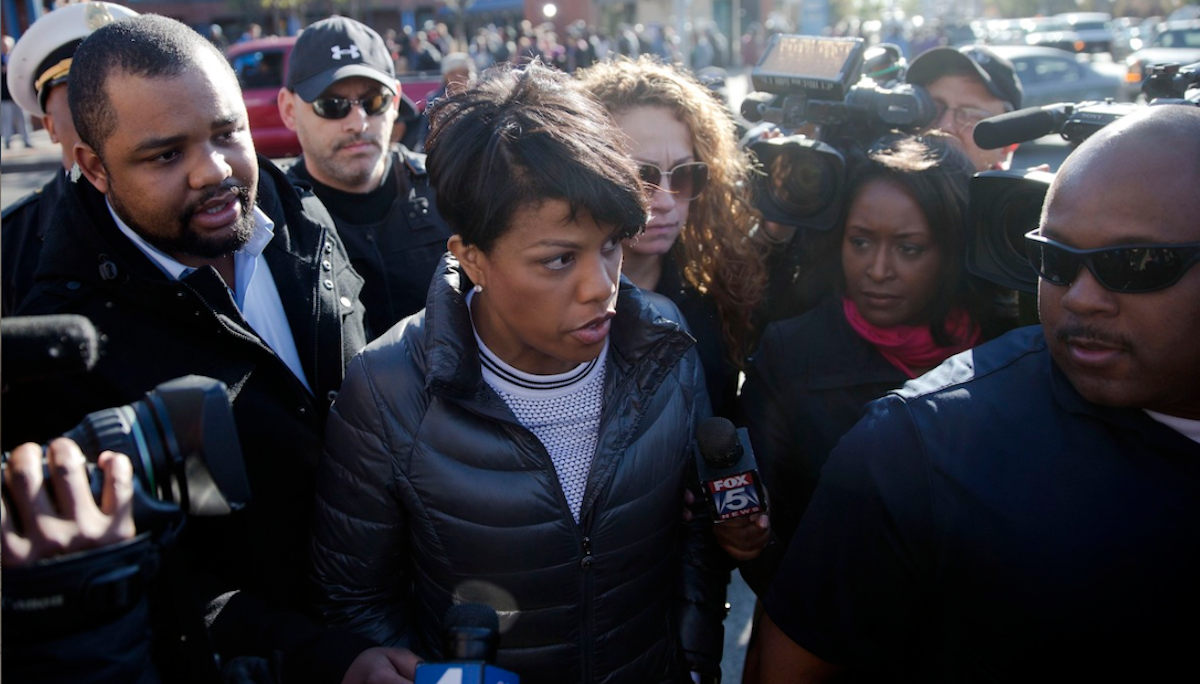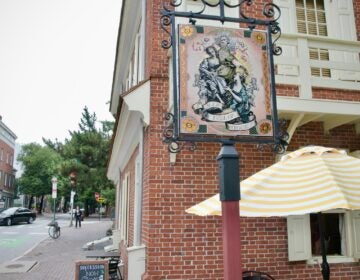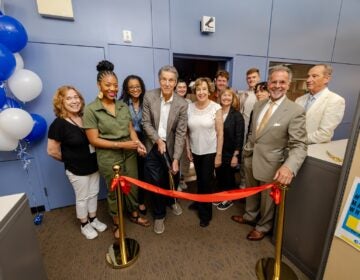Philadelphia mayoral candidates react to Baltimore riots

Baltimore Mayor Stephanie Rawlings-Blake tours the city on Tuesday in the aftermath of rioting following Monday's funeral for Freddie Gray, who died in police custody, in Baltimore. (AP Photo/Matt Rourke)
In the wake of Monday night’s fiery riots, Baltimore Mayor Stephanie Rawlings-Blake has called in the National Guard, called for a week-long curfew and called out “thugs who in a very senseless way are trying to tear down what so many have fought for.”
Some have said Rawlings-Blake has struggled in this position; others, including Mayor Michael Nutter, have defended her.
NinetyNine wanted to know what the candidates for Philadelphia mayor thought about the Baltimore situation, and the handling thereof. What follows are their responses.
Lynne Abraham
I was deeply disturbed to hear about the violence and destruction going on right now in Baltimore. I want to commend the peaceful protesters trying to help build their city back up today.
I agree with President Obama’s statements that the looting and property destruction that occurred yesterday was done by criminals. This is directly opposite how non-violent protesters acted in previous days.
Those initial peaceful protests are an essential American right — the right to raise awareness about a tragic death through positive, non-violent actions. The community doesn’t want violence and destruction, and the city of Baltimore doesn’t want it either.
While watching CNN yesterday, I heard many Baltimore residents ask, “Where is the Mayor?” This is why I believe that being Mayor requires leadership and the ability to make tough decisions.
As Mayor of Philadelphia, I will be in every neighborhood regularly reaching out to leaders in those communities for guidance, collaboration, and understanding before the tragedy occurs. The only way to prevent anger of our community’s most marginalized members is through constructive dialogue, an active presence, and addressing the core issues affecting them in a positive and thoughtful way.
Melissa Murray Bailey
Baltimore Mayor Stephanie Rawlings-Blake seemed to have the best intentions when she instructed the police to do “everything they could to make sure the protesters could exercise their right to free speech.”
When she said, “We also gave those who wished to destroy, space to do that as well” she lost me. As public leaders, we do not sanction the destruction of city property – in this case police vehicles – or private property such as the CVS that was looted and burned.
People have the right to free speech and should be given the right to peaceful demonstrations. As a member of the community, I may not always agree with or like what is being said. As Mayor, my stance is clear – protect the rights of free speech and maintain public safety.
When a peaceful demonstration turns violent, our first responders are thrust into harm’s way. My first priority is our first-responders safety as well as the safety of the public. When I take office, my administration will develop coordinated plans in collaboration with the police, firefighters and other emergency personnel to address these types of situations. I would look at how other cities such as London and Los Angeles have responded to wide-spread riots to influence how our city should prepare for and respond to these situations.
Nelson Diaz
I believe it could happen in Philadelphia if we elect the wrong mayor. You have to address the issue of mistrust between the community and police. If you have, what I continually talk about, community policing, I would have handed it because I would have known beforehand who the troublemakers were, who the actual people who would commit these crimes; you have to have the police integrated within those groups so you can prevent unrest from occuring.
I’ve been involved in the Civil Rights movement my entire life. When the Black Panthers and the Young Lords were involved in demonstrations, I would call the mayor at the time and he would hook me up with the [police department’s] civil disobedience squad. I would get a number of lawyers from the Philadelphia Bar Association, 30 to 40 lawyers who had armbands and we’d get around all the people who were involved in these demonstrations to protect them from police and to protect the police from them. That’s the way it should have been handled. They don’t have that kind of community policing approach there.
She’s a very bright mayor, by the way, a woman I’ve known and has an incredible capacity. I believe that she did not expect it because she’s from a different generation. She’s younger, not a product of the Civil Rights Movement, but a beneficiary of it. That’s why it’s so important for people to remember the past. We repeat our errors over, and over, and over. Look at our wars. …
Also, the speech that was going on in the church was somewhat offensive. I would have talked to the people in the church before the speeches and said, ‘Look, we can have civil disobedience, but we’re not going to have riots. We’re not going to kill the city.’
It’s going to take many, many years for it to revive again. When Harlem got torn down, it was the beginning of the crack-cocaine epidemic in Harlem. Harlem didn’t revive itself until the past 10 years, from the 60s, 70s, 80s, 90, almost two generations to come back. A lot of credit has to go to Bill Clinton because when [the Clinton Foundation] moved in, others felt safe to move in.
We should have had real [police/community] relationships and if you look at that 91-point report, the one that I’ve been talking about is ‘you’re not going to be able to develop trust until you have community policing.’
I’m hoping that whoever the next mayor is — and as you know, we have an uphill battle — that he takes that advice: We have to impose and develop community policing.
Jim Kenney
My heart hurts for Baltimore. Freddie Gray’s death is a tragedy that demands answers and we must continue to press for justice for his family.
While I condemn last night’s violence, we must ask ourselves why so many young people felt that the only avenue for justice was through a mass expression of frustration and anger.
Here in Philadelphia, we have to make sure that every community feels that they have an ear in City Hall as well as a mayor and a Police Commissioner who shares their concerns.
Added Kenney’s spokeswoman Lauren Hitt, in terms of policies Jim would implement to prevent Philadelphia from becoming Baltimore, that’s best outlined in our 17-page public safety policy paper.
Namely, ending stop-and-frisk; hire and promote diversity in the department; continue Mayor Nutter’s Strategic Plan to Reduce Youth Violence & expand the community school model to 25 by the end of his first term in order to engage our at risk kids in school and after-school recreational activities; implement body cameras; implement DOJ & President Obama’s 21st Century Policing Taskforce, institute continuing legal education for police officers, reform training at the academy to include courses on constitution and civil rights history, increase funding for Police Advisory Commission by $1.5 million; reform disciplinary procedure through negotiations with FOP including articles on hate speech; create municipal ID program; expand use of focused deterrence to the entire city; and create a holistic community-policing strategy by increasing neighborhood foot and bike patrols.
Doug Oliver
The whole situation in Baltimore is unfortunate.
The time when you can prevent these sorts of outcomes is before they begin. Prevention is the best cure in this case. The police need to establish and maintain relationships with the community. That’s the best way to prevent it.
It’s hard to sit here and say what could be done differently here in Philadelphia, because all circumstances are not the same from situation to situation. You need to be prepared for anything.
As mayor, I’d have an experienced police commissioner. You need to surround yourself with people who have expertice in a variety of areas, and study best practices locally, statewide, nationally and even internationally. That’s not abdicating responsibility because as mayor, you have to pull the trigger on any plan. You have to make those final calls. Success or failure falls at my feet.
There are things we can do to anticipate [these situations]. Keep up with high-profile cases coming up. Cultivate relationships between police, communities, clergy and the media. Put plans in place. Lay the groundwork. Those things would help reduce the impact and shelf life of these sorts of things.
Milton Street
I think the violence broke out and caught everybody off guard. Apparently, they thought the family’s “be calm” statements would take care of everything.
However, there has to be a trust between the police and community to prevent that. When have a situation when police are suspect to the community, and the community is suspect to police, that will trigger something like this.
It’s ridiculous. You get nothing out of destroying your own community. I was around when riots on Ridge Avenue destroyed everything. I was just a kid, but it was really brutal. We used to have record stores, clothing stores, but they all left after that. It was just vacant then. They didn’t come back, and why would they? So, it’s really ridiculous. It boggles the mind.
My understanding is that [Baltimore] started with kids, but then everybody got involved when the looting started.
She did the right thing by calling in National Guard because handing the situation was beyond her police force’s capabilities. I would have called them in right away.
Anthony Hardy Williams
I’ve thought about it in the context of what I will do for Philadelphia.
I’ve heard a lot of people sort of grade what they would do, what they should have done, how they would have done it better than Baltimore. I’m not an armchair quarterback in that category.
What I am is facing the reality of what could happen in the city of Philadelphia. Unfortunately, we have a set of circumstances which parallel that of Baltimore, but we’re a much bigger city.
So, the consequences if we don’t get about the business of having true diversity within our department, organizing our community policing, having technology available, and then removing hate speech, then we’re sitting on a powderkeg, if you will, relative to what could happen in Philadelphia.
All those things are things we can change tomorrow. I’m not suggesting that those doing police work in Philadelphia are not being effective in terms of policing. They are. But, the social dynamics of the space in which we’re living today is very, very challenging.
I will tell you this: that mom that we saw on television that smacked her kid in the head, I was chuckling as I saw the national reporters saying, ‘Ah, that’s a great mom!’ Of course, if she had smacked him at another time, they would talk about, ‘Oh my God, maybe we should lock her up.’ Those are the dualities and paradoxes of what people feel in these moments.
Philadelphia is no different. I do want more parents to step up like that, though, because that’s the reality. These children need guidance, they need leadership, they need love, they need somebody that’s going to stick beside ’em when they’re in that 14-year-old age that we’ve all been through. It’s difficult enough if you have two parents at home with a lot of money. If you have a single parent at home, or no parents at home, it’s even more challenging.
I think we can do all that work. I look forward to what we can do as opposed to what [Baltimore officials] should have done, because that’s over. What we need to do is protect from it happening in Philadelphia.
WHYY is your source for fact-based, in-depth journalism and information. As a nonprofit organization, we rely on financial support from readers like you. Please give today.




